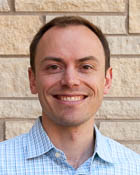 Abdominal Imaging and Intervention Fellow George A. Carberry, M.D., has been awarded a Research Fellow Grant from the Radiological Society of North America (RSNA) to establish the safety of microwave ablation of lung tumors located near the heart.
Abdominal Imaging and Intervention Fellow George A. Carberry, M.D., has been awarded a Research Fellow Grant from the Radiological Society of North America (RSNA) to establish the safety of microwave ablation of lung tumors located near the heart.
His co-investigators include Christopher Brace, Ph.D., and Fred T. Lee Jr, M.D. Drs. Brace and Lee have been at the forefront of microwave ablation for nearly two decades, developing both devices and techniques.
Percutaneous microwave ablation is an increasingly common treatment for tumors of the lung, liver, and kidneys. This minimally invasive procedure can destroy these tumors quickly and efficiently. It is especially useful for early-stage tumors in patients that are too sick to undergo major surgical resection, as the risk of surgical complications is high. However, challenges still remain for certain types and locations of tumors.
“Lung tumors that arise near the heart present a technical challenge because the thermal energy that we apply may also contact the heart and result in dangerous arrhythmias and myocardial injury,” said Dr. Carberry. “The purpose of our project is to develop a way to kill lung tumors near the heart without affecting the adjacent heart tissue.”
Initial studies carried out by Dr. Carberry indicate that the ablation device’s orientation and distance relative to the surface of the heart impact the frequency of complications. To combat these complications, Dr. Carberry will write algorithms that restrict the ablation device to “safe” positions. If successful, this will allow doctors to safely ablate lung tumors near the heart without damaging the heart itself.